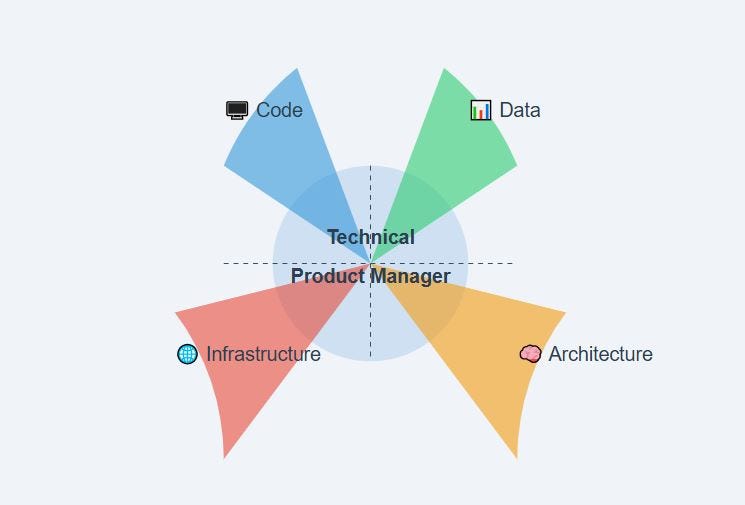Every time I meet young PMs; the first question is - “How technical should a product manager be?”
While the exact level varies by industry and product, a foundational understanding of technical concepts can be a game-changer for a PM. Let’s explore why technical expertise matters and how it can enhance a PM’s effectiveness, using real-world examples.
1. Facilitating Clear Communication
A PM acts as a bridge between cross-functional teams, including engineers, designers, and stakeholders. A basic understanding of technical concepts allows the PM to:
- Speak the Language of Engineers: Understanding terminology like APIs, databases, and system architecture enables a PM to have meaningful conversations with developers. For example, if a developer mentions that a feature requires significant "backend refactoring," a technical PM can grasp the implications and make informed decisions about timelines and priorities.
- Avoid Miscommunication: Consider a PM working on a mobile app. If the PM understands the difference between native and hybrid app development, they can set realistic expectations with stakeholders about development timelines and costs.
2. Assessing Technical Feasibility
A technical PM can quickly evaluate the feasibility of ideas, saving time and resources. For instance:
- Example 1: Imagine a PM managing a cloud-based file storage service. When a customer requests real-time file syncing, the PM with technical knowledge can understand the complexity of building a real-time synchronization algorithm and the potential challenges in latency and scalability.
- Example 2: In a SaaS environment, if a stakeholder requests a new dashboard with advanced analytics, a technical PM can discuss data processing pipelines with engineers to ensure the feature aligns with the current infrastructure.
3. Prioritizing Engineering Efforts
Technical expertise helps a PM prioritize features effectively by understanding trade-offs between effort, value, and risk. For example:
- Example: A PM at an e-commerce platform might need to choose between implementing a new recommendation engine or optimizing page load times. Knowing that reducing page load times directly impacts user experience and conversion rates, a technical PM can make data-driven decisions.
4. Enhancing Collaboration and Credibility
When PMs demonstrate technical knowledge, they gain trust and credibility within the engineering team. Engineers are more likely to engage openly and share concerns when they feel the PM understands their work. For example:
- Example: At a fintech company, a PM who understands the basics of encryption and compliance can have constructive discussions with engineers about implementing secure payment gateways, ensuring regulatory standards are met.
5. Bridging the Gap Between Vision and Execution
A technical PM can translate high-level ideas into actionable requirements. They can break down complex projects into manageable tasks and write clear user stories. For example:
- Example: At a health tech startup, a PM working on a telemedicine platform might need to define requirements for integrating video calling APIs. Their technical understanding ensures the requirements are precise and account for dependencies like bandwidth and device compatibility.
6. Supporting Agile Practices
In Agile environments, a technical PM can participate in sprint planning, backlog grooming, and standups more effectively. For example:
- Example: During a sprint review, a PM working on a CRM tool might discuss the implications of incomplete API integrations on downstream features, ensuring the team adjusts priorities accordingly.
Do PMs Need to Code?
While PMs don’t need to code daily, familiarity with coding can be beneficial. For instance:
- Debugging Issues: A PM with basic SQL skills might pull their own reports or debug data-related issues.
- Prototyping: Understanding HTML and CSS can help a PM create simple prototypes to communicate ideas more effectively with designers and developers.
Tailoring Technical Skills to Your Role
The level of technical expertise required depends on the product and industry. For example:
- Highly Technical Products: PMs working on developer tools, APIs, or AI models need deeper technical knowledge.
- Consumer-Facing Products: PMs managing mobile apps or e-commerce platforms may benefit more from user experience insights but still need to understand the technical implications of design choices.
The Balancing Act
While technical expertise is valuable, it's crucial for PMs to avoid becoming overly technical. The primary focus should always be on understanding the "why" behind the "how." Deep diving into technical details can distract from the core business objectives and hinder the ability to see the bigger picture. It might also lead to conflicts with developers on the execution approach.
Conclusion
Technical expertise is not about replacing engineers but about empowering PMs to work smarter and more collaboratively. By understanding the fundamentals of technology, PMs can bridge gaps between teams, make informed decisions, and drive successful product outcomes. The depth of technical knowledge required depends on the product, but a curious mindset and a willingness to learn can elevate any PM’s career.


